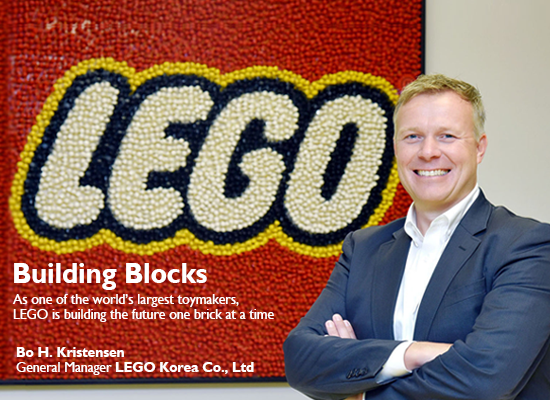Feature Stories
- Home
- Why KOREA
- Feature Stories

As one of the world’s largest toymakers, LEGO is building the future one brick at a time
Over the last year and a half, I’ve done countless interviews with companies in every industry imaginable—from cosmetics and chemical materials to AI and automobiles. But no company has brought about such strong feelings of nostalgia like LEGO. In an era where people are glued to their cellphones (including yours truly) and everything is becoming digital, LEGO Group’s brightly colored toy bricks continue to appeal to kids and kids at heart. LEGO bricks are part of a “universal system”, meaning that regardless of the year it was made and the set it belongs to, each piece is compatible with existing pieces. So a LEGO brick from 1965 would still interlock with one made in 2017. It’s this kind of connection with the past, present and future that brings about endless possibilities and creative expression for the consumer. LEGO lovers have let their imagination fly over the years, building everything from real houses and life-size forests to even a braille printer for the blind.
LEGO Korea’s General Manager Bo H. Kristensen hopes to continue this tradition of challenging both young and old consumers to think outside the blocks. As the most innovative country on earth, Korea provided an ideal business and consumer environment for the company. Here’s what Kristensen had to say about the company’s success in Korea.
How was LEGO founded?
Our company name LEGO derived from the Danish phrase ‘leg godt’, which translates into ‘play well’.
The LEGO Group is a privately held, family-owned company with headquarters in Billund, Denmark, and main offices in the United States, United Kingdom, China and Singapore. Founded in 1932 by Ole Kirk Kristiansen, and based on the iconic LEGO brick, it is one of the world's leading manufacturers of play materials.
Guided by the company spirit: "Only the best is good enough”, the company is committed to the development of children and aims to inspire and develop the builders of tomorrow through creative play and learning. LEGO products are sold worldwide.
LEGO Korea Co., Ltd. was founded in 1984 currently focusing on sales, marketing and customer service. Think of us as the LEGO Group being in Korea. We operate at the same level as we do in Denmark.
What made LEGO want to establish a business unit here in Korea?
Korea is one of the most important markets in Asia due to its unique environment – a great market to learn from and apply globally within the LEGO Group. When it comes to toys, Korea is a highly advanced and dynamic market that requires companies to adapt to its speed. In our view, this is mainly driven by Korean consumers as they are more attracted to quality contents.
In addition, the educational aspect for kids plays an enormous role within Korea – an area where LEGO can support and help in the long-term. When elaborating a bit more on quality, the retail space is more than developed compared to other developed markets. One of our key executives visited Korea at the end of last year and he was shocked with the high retail standards.
All this is only possible thanks to the high level of workforce in Korea. I have the privilege of working with exceptional team members here in Korea as they have the ability to assess and view any situation from various perspectives, especially cross-culturally. They also bring broad business acumen and understanding, as well as an open-minded perspective that serves Koreans as well as non-Koreans equally.
When it comes to Korean toy companies, they have an enormous potential of cultural impact outside of Korea. Their recent moves are a great way to influence other markets backed by unique and fun stories in relation to their products.
LEGO also has its unique characteristics of unlimited play—only limited by your own imagination. Its expandability goes beyond just products. It can expand to other sectors such as movies, exhibitions, cultural content, education and many more.
Were there any challenges that the company faced while trying to expand its business in Korea?
The key challenge was and still is delivering the true value of LEGO. LEGO is beyond toys as we try to convey the true play culture—imagination, creativity, fun, learning, caring and quality.
Korean consumers are aware of the LEGO brand and its educational values. But awareness on the social aspect—creating something together and sharing them—of LEGO is still missing. We want to change it.
Let me give you an example. I have heard that Korean parents laminate our building instructions so that their kids can rebuild our LEGO sets over and over again. But the core value of LEGO is not about just following the instructions in a LEGO set. It’s about putting all the bricks in one box and creating something totally new based on your own imagination.
Does your company closely work with any Korean companies to strengthen its business partnership?
We have a very close relationship with our local retail partner. Our relationship goes years back with strong foundation that mutually benefits both parties. Based on the LEGO Group’s brand framework, we uphold our highest respect towards our partners to fulfill our partner promise, which is to create mutual value. When it comes to working together, trust is crucial and this goes both ways.
What is the main vision of LEGO Korea?
Our primary goal is to reach out to as many kids as possible to inspire and develop the builders of tomorrow. To reach our goal, it is important to promote the joy of building and pride of creation. Key values that we envision for the future of kids in Korea is imagination, creativity, fun, learning, caring and quality.
By Esther Oh (estheroh@kotra.or.kr)
Executive Consultant/Invest Korea










